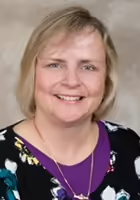
8753 S. Greenwood Avenue, Suite 100 Chicago IL 60619
Molly Hofer is a family life educator with the University of Illinois Extension. In this role, Molly is responsible for providing educational leadership for family life issues related to adult life and aging. Molly has a master of arts degree in gerontology from Western Illinois University. Her undergraduate degree is also from Western in home economics with a specialization in gerontology.
Molly's interest areas range from intergenerational relations to ageism, women and aging, aging awareness training, reminiscence and storytelling, family caregiving and grandparent issues. Molly's professional affiliations include the Illinois Extension Association of Family and Consumer Sciences, Epsilon Sigma Phi, Chicago Metropolitan Intergenerational Committee, the Illinois Task Force on Grandparents Raising Grandchildren, and the American Society on Aging. Molly's personal interests include reading, watching old movies, and cheering her son, Erick on at his baseball and hockey games.
Program Offerings
Following is a partial list of Hofer's program offerings:
Walk In My Shoes – Aging Awareness Training
Unfortunately, because of societal myths and stereotypes, older adults are sometimes seen as senile, poor, useless, and a burden to society. These negative attitudes about aging and the aged may influence the way we relate to older adults causing poor relationships and interactions. Walk In My Shoes can be a valuable educational tool that will teach participants to be more sensitive to the needs of older adults. It will increase one's understanding of normal age-related sensory changes, will dispel the myths of aging, and will present a more positive focus on the realities of aging and the aged.
Who Gets Grandma's Yellow Pie Plate?
Almost all individuals have valued personal belongings. Participants explore ways to talk to family members about the difficult subject of distributing family items with emotional and sentimental value while still keeping relationships intact.
Building a Better Memory
Many of us believe the myth that aging and memory loss go hand in hand. The reality is that memory does change as we age, but forgetfulness is common for people at all stages of life. It's important to note that memory can be strengthened. This workshop will cover how researchers are examining the memory process, how memory changes as people age, and some techniques and strategies for improving memory.
Stories From Your Past, A Legacy for the Future
We live in an amazing technological age. Historical information is recorded almost before it happens. Yet, ironically, many adults and children know very little about their own family history. Family mobility, geographical distance, and hurried lifestyles provide limited opportunities for younger and older generations to engage in family storytelling, an activity that used to be a natural occurrence in the daily lives of most families. This workshop helps participants understand the history of storytelling and helps them explore ways to preserve individual and family stories for future generations.
Caregiving Relationships for People Who Care for Adults
Caring for parents and other dependent family members is a growing concern for families. More than 80 percent of care provided to older people comes from family members. The family is a major resource in helping older members with emotional and social support, crisis intervention, and linkages with the health care system. By participating in this program, participants will have the opportunity to become more conscious of their needs as caregivers and learn how to develop a plan to meet those needs.
Building Bridges Across the Generation Gaps
The good news is that people are living longer and living longer well. There is a challenge that comes with this good news. There are more generations than ever living and thriving in all aspects of American life. In many cases, each generation comes with its own perspective. Sometimes these perspectives are quite different and clash with one another. Learning to cope with the misunderstandings that can result from intergenerational relationships at home, at work and in the community is very valuable. This program discusses what perspectives today's generations share and how they differ. Participants will also learn how to communicate effectively to build bridges across the generation gaps.